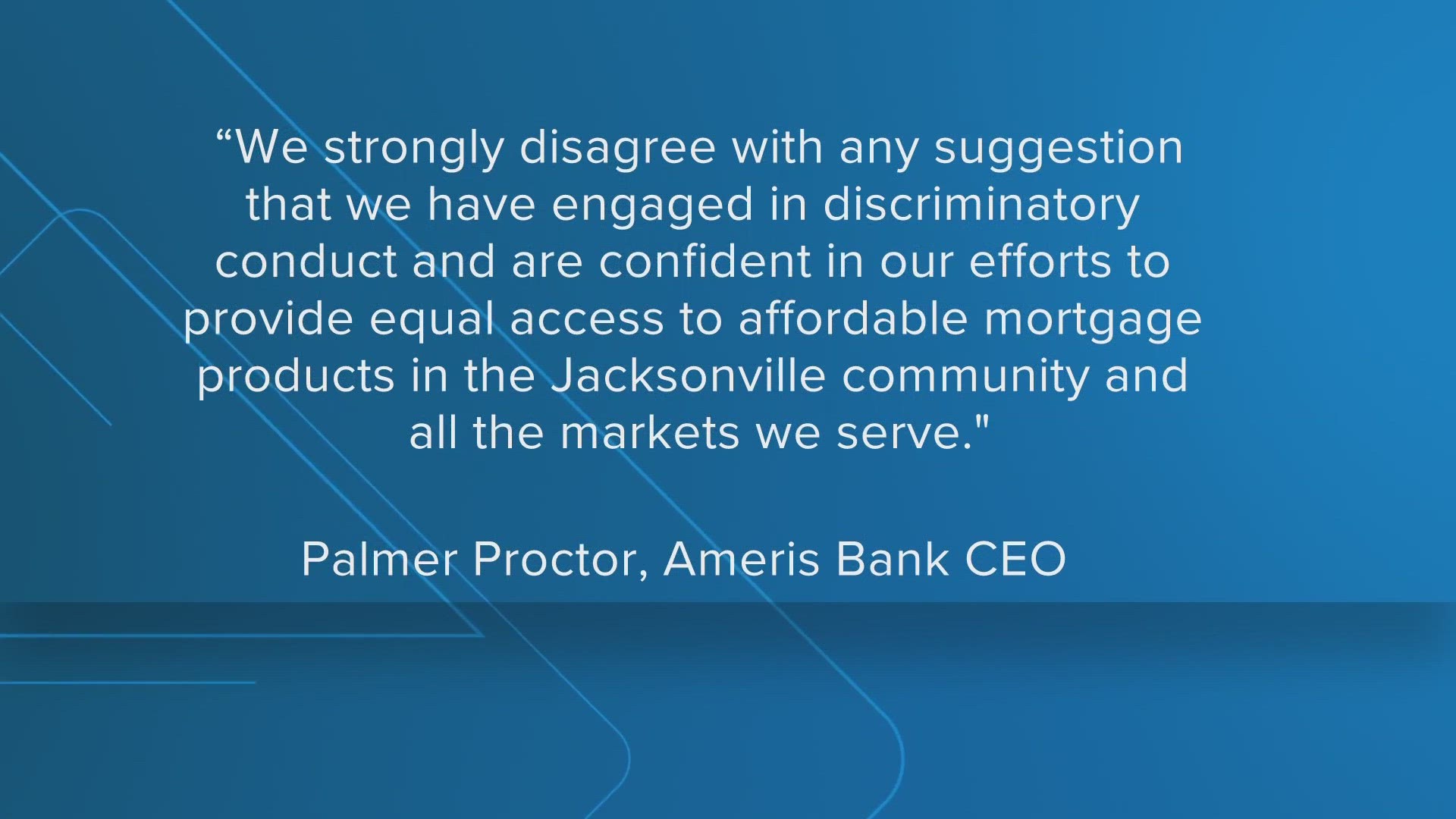JACKSONVILLE, Fla. — Ameris Bank has agreed to enter in a consent decree regarding the Department of Justice's allegations that the bank engaged in redlining as it violates the Fair Housing Act and the Equal Credit Opportunity Act - two federal civil rights laws that prohibit discrimination in lending.
"Redlining occurs when lenders deny or discourage applications or avoid providing loans in neighborhoods because of the race, color or national origin of the people who live in those neighborhoods," Attorney General Merrick B. Garland said during a press conference held in Jacksonville Thursday.
The DOJ's complaint stems from the bank allegedly denying or discouraging home loan applications and other credit opportunities and services in "major Black and Hispanic neighborhoods here in Jacksonville."
"Redlining makes it difficult for people of color to accumulate wealth through the purchase, refinancing, or repair of their homes. It continues to deepen the persistent wealth gap in our country. This kind of discrimination in lending violates federal law," Garland said.
As a result of DOJ's investigation, Garland says they've reached a settlement with Ameris Bank and if approved by the court, the bank would be required to pay $9 million to expand access to credit opportunities for residents of Black and Hispanic neighborhoods in Jacksonville.
"Our complaint alleges that the bank located its branches in specific areas of Jacksonville, to serve majority white neighborhoods, and to avoid serving Black and Hispanic neighborhoods," Garland said.
Garland accuses Ameris Bank of the following:
- Establishing branches in specific areas of Jacksonville to serve majority white neighborhoods and to avoid serving Black and Hispanic neighborhoods
- Failing to open one branch in a predominately Black and Hispanic neighborhood, but opened 18 full-service branches in other parts of Jacksonville serving white communities.
- In 2019, Ameris closed two Jacksonville branches as part of its "efficiency initiative." Garland says Ameris identified both of the branches of having "minority populations higher than nearby branch locations." One of the branches that was located in what Ameris called "the Urban Core of Jacksonville," Garland says, was the closest branch to most of the city's Black and Hispanic neighborhoods. Garland says the branch was rated as one of the "best financial performers," among all of the bank's locations across the country, according to Ameris. Ameris did not close any branches in the predominately white areas of Jacksonville as part of their initiative, Garland says.
- In 2020, Ameris sent out 22,000 free checking mailers that Garland says the bank said was targeted to low and moderate income areas in majority of minority neighborhoods. Garland says the postcards were mailed out to 13 zip codes in Jacksonville as they had "images of white models" on them. Garland says "not one postcard was sent to a single resident in a majority Black and Hispanic neighborhood."
- Assistant Attorney General Kristen Clarke of the Civil Rights Division alleges that Ameris knew they were redlining for years and "did not make sufficient efforts to reach neighborhoods of color [and] mortgage bankers failed to serve those communities and marketing and outreach efforts were directed toward white communities."
"The majority of applications were from majority white neighborhoods south of the St. Johns River. In contrast, there was a lack of applications from the majority black and Hispanic neighborhoods in the red and orange area, particularly Downtown where 80% of residents are black and Hispanic," Assistant Attorney General of the Civil Rights Division Kristen Clarke said.
What happens with the settlement money?
Garland says a majority of the $9 million in the settlement will be in the form of loan subsidy funds and can be used by Jacksonville residents for down payments to lower their interest rates and to make home improvements that will increase the value of their home. The settlement also requires that the bank must open its first full-service branch located along the St. Johns River, in a majority Black and Hispanic neighborhood in Jacksonville.
Garland launched the 'Combating Redlining Initiative' in October 2021. Once the settlement is approved, Garland says the initiative would have secured more than $100 million in total for communities across the country that have been harmed by "discriminatory lending practices."
Once the $9 million dollars is approved by the court, Ameris Bank will invest in advertising and outreach of residents of the affected neighborhoods, develop community partnerships to provide services to increase access to residential mortgage credit, open a new branch in a majority black and Hispanic neighborhood in Jacksonville, and hire staff to support it.
In a statement, Ameris CEO Palmer Proctor says the company is fully cooperating with the department but: "We strongly disagree with any suggestion that we have engaged in discriminatory conduct and are confident in our efforts to provide equal access to affordable mortgage products in the Jacksonville community and all the markets we serve."
U.S. Attorney Roger Handberg warned modern day redlining will not be tolerated in the Middle District of Florida. The Justice Department says it has secured over $107 million in relief for communities of color nationwide that have experienced discrimination by banks and other mortgage lending businesses and there are more than two dozen active investigations into redlining across the country.
Over past two years, the DOJ says they have reached 10 settlements with lending institutions to resolve allegations of redlining.

